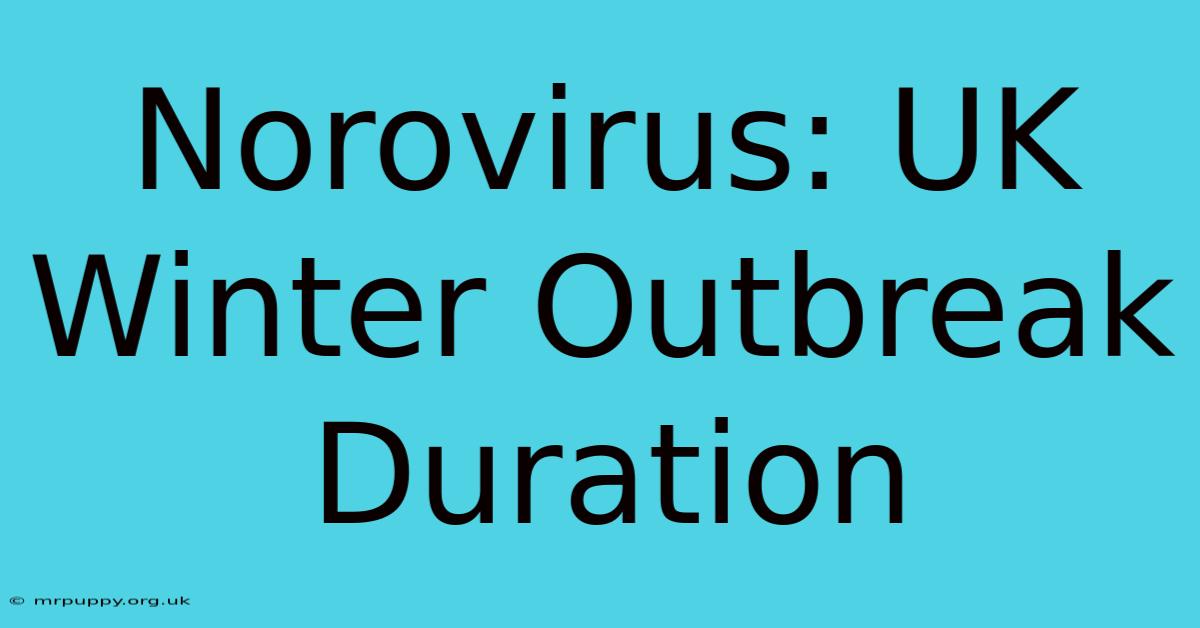Norovirus: How Long Does the UK Winter Outbreak Last?
Is the UK winter norovirus outbreak always a long-lasting battle? The answer is a resounding yes! Norovirus, known colloquially as the winter vomiting bug, can wreak havoc on individuals and communities throughout the winter months.
Why This Matters
This article delves into the duration of the UK norovirus winter outbreak. It aims to provide insights into the seasonal patterns of this highly contagious illness, its impact on individuals and healthcare systems, and measures to protect yourself and others.
Key Takeaways of Norovirus:
| Category | Insights |
|---|---|
| Seasonality | Peaks during winter months in the UK. |
| Contagiousness | Highly contagious, easily spread through contact with infected individuals or contaminated surfaces. |
| Symptoms | Sudden onset of vomiting and diarrhoea, accompanied by stomach cramps, headache, and fever. |
| Duration | Illness typically lasts 1-3 days, though some individuals may experience symptoms for longer. |
| Prevention | Proper handwashing, avoiding close contact with infected individuals, and thorough disinfection of surfaces are crucial. |
Norovirus
Understanding the Winter Norovirus Outbreak:
Norovirus is a highly contagious virus responsible for most cases of gastroenteritis, commonly known as the "stomach flu" or "winter vomiting bug". While often referred to as a "winter" illness, norovirus infections can occur year-round. However, the UK sees a significant peak during the winter months, typically from November to April. This seasonal pattern is attributed to several factors:
- Increased indoor gatherings: People spend more time indoors during winter, increasing the chance of close contact and virus transmission.
- Cold and dry air: The cold, dry air of winter can help norovirus survive for longer periods on surfaces.
- Reduced immunity: The immune system can be compromised during the winter months due to factors like cold temperatures and reduced vitamin D levels.
Key Aspects of the Norovirus Outbreak Duration:
- Peak season: While the outbreak typically begins in November, it reaches its peak in January and February.
- Duration: The outbreak usually lasts for several months, with cases declining gradually as spring approaches.
- Individual vulnerability: Norovirus infections can affect anyone, but young children, the elderly, and those with weakened immune systems are at increased risk of severe illness.
Impact on Health Systems
The widespread nature of norovirus outbreaks places significant strain on healthcare services, especially during the winter months.
- Increased hospital admissions: Norovirus outbreaks lead to a surge in hospital admissions, particularly among the vulnerable population.
- Staff shortages: Healthcare professionals can also fall ill, leading to staff shortages and disruptions in service delivery.
- Infection control measures: Hospitals and other healthcare settings implement strict infection control measures to prevent further spread, which can impact service provision.
Protection and Prevention
- Handwashing: Frequent and thorough handwashing with soap and water is the most effective way to prevent norovirus infection.
- Surface disinfection: Regularly clean and disinfect frequently touched surfaces, such as doorknobs, light switches, and countertops.
- Food safety: Properly cook food, especially shellfish, and avoid eating raw or undercooked foods.
- Staying home when sick: If you have symptoms of norovirus, stay home to prevent spreading the virus to others.
- Vaccinations: Currently, no licensed vaccine is available for norovirus.
FAQs
What is the incubation period for norovirus? The incubation period is typically 12-48 hours, meaning symptoms will appear 12 to 48 hours after exposure to the virus.
How long am I contagious for with norovirus? You can remain contagious for up to two weeks, even after symptoms have subsided.
How do I avoid getting norovirus? The most effective way is through strict hygiene measures, like thorough handwashing, especially after using the toilet, before eating, and after handling food.
Is norovirus the same as the flu? While both can cause similar symptoms, they are caused by different viruses. The flu is caused by influenza virus, while norovirus is responsible for stomach flu.
Can I take antibiotics for norovirus? Antibiotics are not effective against norovirus, as it is a virus and not a bacterial infection.
What can I do to relieve norovirus symptoms? Drink plenty of fluids to avoid dehydration, and rest until you feel better.
Tips for Managing a Norovirus Outbreak
- Wash your hands thoroughly and often: This is the most critical step in preventing the spread of norovirus.
- Clean and disinfect surfaces: Clean and disinfect frequently touched surfaces, especially in shared spaces.
- Isolate infected individuals: If you suspect you have norovirus, stay home to prevent spreading the virus.
- Stay hydrated: Drink plenty of fluids to avoid dehydration, especially during the illness.
- Consider over-the-counter medications: Over-the-counter medications like anti-diarrheal drugs or anti-nausea medication may help relieve symptoms.
Summary
Norovirus outbreaks in the UK are a common occurrence during the winter months, impacting individuals, healthcare systems, and communities. While there is no cure for norovirus, practicing good hygiene measures and staying home when sick are crucial to preventing the spread. The winter norovirus outbreak typically lasts for several months, from November to April, with the peak in January and February.
Closing Message: By understanding the duration and impact of norovirus outbreaks, we can take proactive steps to protect ourselves and others. Remember, proper hygiene measures are essential to staying healthy and minimizing the spread of this highly contagious virus.

